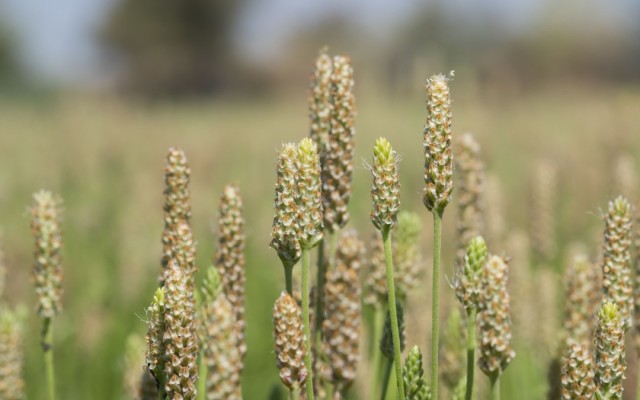There is a trend these days to label many highly nutritious feed ingredients as worthless wastes. This particularly falls on anything that might be classified as a by-product, including beet pulp, wheat mids, soybean hulls and distiller’s dried grains.
Do you consider such things are semolina, wheat germ, rice bran, linseed meal, corn meal, couscous, molasses, copra (coconut meal), Psyllium, and bran cereals to be by-products? Probably not, but like the ingredients listed first they are all co-products generated during the processing of a food to remove certain portions of it.
Psyllium products are made from the thin coat surrounding Psyllium seeds
Soybean meal, like all seed meals, is a co-product of the oil extraction industry. They have all of the protein, carbohydrates/fiber, vitamins and minerals of the original food, just not the high fat. As a plus, reducing the fat considerably boosts the protein percentage in the meal.
Some of the prejudice against co-products likely arises from unfamiliarity. You won’t find beet pulp on the shelf in human food stores because people can’t digest it – but horses can. Beet pulp is a low sugar, essentially zero starch, high soluble fiber that is easily fermented in the horse’s hind gut, is prebiotic and yields more calories/energy than hay. The same is true of soybean hulls.
Some co-products have unique characteristics. Feeding distillers’ or brewers’ dried grain instead of corn, etc. means starch and calories have been reduced to very low levels via fermentation of the grain but palatability is retained and protein is significantly higher than in the grain.
Psyllium (Plantago) husks are another specialty co-product. They are the thin outer coating on Psyllium seeds and are rich in mucilage, a form of soluble fiber. When fed on an intermittent basis they are an effective way to enhance sand removal from the colon. When fed on a daily basis they become a prebiotic as the hind gut organisms adapt and begin to ferment them. An added bonus is that wet Psyllium gives a distinctly slippery/slimy coating to a meal which makes it easy to swallow.
Co-products may be criticized because they are not whole foods but the whole foods mentality can be carried too far. Do you eat peanut shells or walnut hulls when you eat those foods? Lemons, bananas or oranges with the peel? Of course not, because they are largely undigestible and/or unpalatable.
Co-products may actually have enhanced nutritional qualities for the horse. Beet pulp, distillers’ dried grains, brewers’ dried grains are safer because of greatly reduced sugar and starch levels. Seed meals have reduced calories because of fat removal and higher % of protein. Brans and seed coats have very good to high protein levels, low sugar/starch and are good mineral sources. Wheat co-products have all the concentrated nutrition of wheat without the starch, which was processed out to make white flour for people.
Not all co-products are appropriate for horses (e.g. oat hulls or cottonseed products) but those you find in feeds and supplements typically are. Be fully informed before you make a judgement call. There’s a good chance your own diet contains co-products.
Eleanor Kellon, VMD
